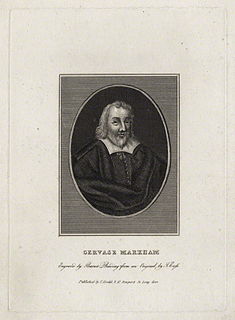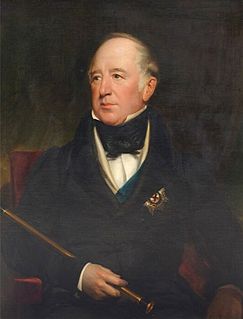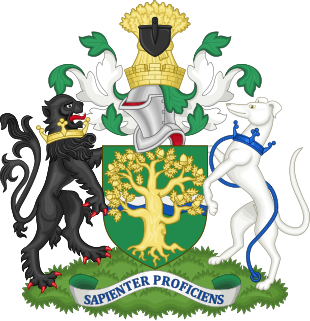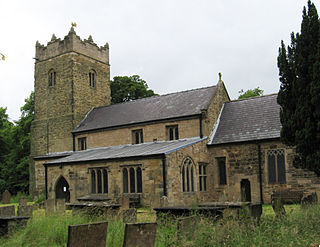Related Research Articles

GervaseMarkham was an English poet and writer. He was best known for his work The English Huswife, Containing the Inward and Outward Virtues Which Ought to Be in a Complete Woman, first published in London in 1615.

Bernard Edward Howard, 12th Duke of Norfolk, was a British peer.

This is a list of the High Sheriffs of the English county of Nottinghamshire.
Sir Griffin Markham was an English soldier.
Caryll Molyneux, 3rd Viscount Molyneux was an Irish peer.
Sir James Harington of Exton was a 16th-century English public servant who fulfilled a number of legal, legislative and law enforcement duties and was knighted in 1565.
Sir John Stanhope was an English knight and landowner, and father of Philip Stanhope, 1st Earl of Chesterfield.

Teversal is a small village in the Ashfield district of Nottinghamshire, England, located 3 miles (5 km) west of Mansfield, close to Sutton-in-Ashfield and also the boundary with Derbyshire. Former names include Tevershalt, Teversholt, Tyversholtee, Teversale, Tevershall and Teversall.

There have been three baronetcies created for descendants of the ancient Norman family of Molyneux who were granted extensive estates in Lancashire after the Norman Conquest.
The Sheriff of Nottinghamshire, Derbyshire and the Royal Forests is a position established by the Normans in England.

The St Katherine's Church is on Buttery Lane, Teversal, Nottinghamshire, England. It is an active Church of England parish church in the deanery of Newstead, the Archdeaconry of Newark, and the Southwell and Nottingham diocese. Its benefice has three churches, St Andrew's Church, Skegby, All Saints' Church, Stanton Hill and St Katherine's itself. The church is recorded in the National Heritage List for England as a designated Grade I listed building.
Richard Molyneux, 2nd Viscount Molyneux of Maryborough, was a Royalist officer in the English Civil War
Richard Molyneux, 1st Viscount Molyneux (1594–1636) was an English politician who sat in the House of Commons at various times between 1614 and 1629.
Lord Henry Thomas Howard-Molyneux-Howard, known as Henry Howard until 1812, and as Henry Molyneux-Howard until 1817, was a British gentleman who served as Deputy Earl Marshal in the latter part of the reign of George III and early in the reign of George IV. On the inheritance of the Dukedom of Norfolk in 1815 by his elder brother Bernard, Henry Molyneux-Howard in 1817 was granted the courtesy title "Lord", the style of a younger son of a duke.

John Harington, 2nd Baron Harington of Exton, of Burley-on-the-Hill, Rutland was a young English peer and politician. He was the Lord Lieutenant of Rutland and Baron Harington of Exton.
Isabella Markham, was an English courtier, a Gentlewoman of the Privy Chamber of Queen Elizabeth I of England and a personal favourite of the queen. Isabella Markham was muse to the court official and poet John Harington, who wrote sonnets and poems addressed to her, before and after they married. Thomas Palfreyman dedicated his Divine Meditations to her in 1572.
Edmund Molyneux, was a biographer and Secretary to the Lord Lieutenant of Ireland.
Bridget Markham (1579–1609), was a courtier to Anne of Denmark and subject of poems.
Sir James Harington, 1st Baronet (1542–1613/4) of Ridlington, Rutland was an English politician.
Sir Edward Harington of Ridlington, English landowner.
References
- ↑ F. R. Raines, The Derby Household Books (Chetham Society, Manchester, 1853), p. 209.
- ↑ John Peile, Biographical Register of Christ's College, 1505-1905, vol. 1 (Cambridge, 1910), p. 230.
- ↑ Isobel Markham was alive in July 1607 when John Markham included her in his will, Arthur Roland Maddison, Lincolnshire Wills: 1600-1617 (Lincoln, 1891), p. 22.
- ↑ Robert Thoroton, History of Nottinghamshire, vol. 1 (London, 1797), p. 356.
- ↑ 'Will of Briget Markham, Widow of Sudbrooke, Lincolnshire', TNA PROB 11/114/485.
- ↑ R. R. Rawlins, 'Teversall Hall', The Gentleman's Magazine, supplement vol. 84 part 2 (London, 1814) p. 617, with engraving of the unroofed house.
- ↑ R. R. Rawlins, 'Teversall Church', The Gentleman's Magazine, vol. 80 part 1 (London, 1810) p. 120-122.
- ↑ Gisbourne Molineux, Memoir of the Molineux Family (London, 1882), p. 49 fn: John Nichols, The Progresses, Processions, and Magnificent Festivities, of King James the First, vol. 3 (1828), p. 338.
- ↑ Gisbourne Molineux, Memoir of the Molineux Family (London, 1882), p.47 fn.
- ↑ Gisbourne Molineux, Memoir of the Molineux Family (London, 1882), pedigree no. 2.
- ↑ Gisbourne Molineux, Memoir of the Molineux Family (London, 1882), pp. 48-9.
- ↑ Gisbourne Molineux, Memoir of the Molineux Family (London, 1882), pedigree no. 2.
- ↑ CSP Domestic Charles I: 1633-4 (London, 1863), p. 301.
- ↑ Daniel Lysons, Magna Britannia, a concise topographical account of the several counties of Great Britain: Derbyshire, vol. 5 (London, 1817), p.82.